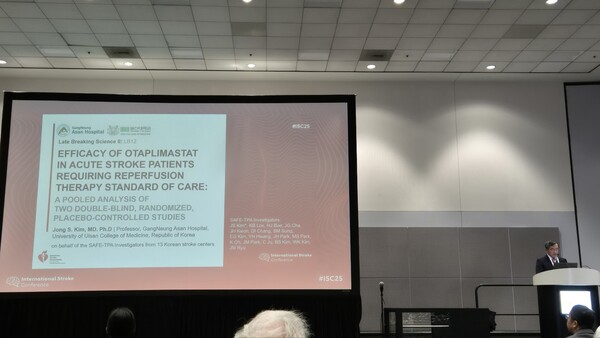Shinpoong Pharmaceutical said it presented the results of a phase 2 clinical trial of its innovative stroke drug candidate, otaplimastat (code-named SP-8203), during the International Stroke Conference (ISC2025) at the Los Angeles Convention Center in Los Angeles, Calif., on Thursday last week, local time.
ISC is one of the most prestigious congresses in stroke, along with the European Stroke Organization Conference (ESOC).

Shinpoong's presentation was a pooled analysis of the results from the phase 2 trial in 226 patients with acute ischemic stroke. The study was selected for oral presentation in the Late Breaking Science session, which attracted considerable attention.
Otaplimastat is a first-in-class drug developed independently by a Korean pharmaceutical company for the first time worldwide. It inhibits matrix metalloproteinases associated with brain injury and has been shown to exhibit neuroprotective effects through anti-inflammatory and antioxidant multiple mechanisms.
In the study, Shinpoong demonstrated that the combination of otaplimastat in acute ischemic stroke patients receiving standard treatment with tissue plasminogen activator (tPA) (Actilyse in trademark) improved functional disability (90-day modified Rankin Score (mRS) 0-2), improved neurological impairment (National Institutes of Health Stroke Scale (NIHSS)), and reduced brain infarct size by MRI analysis.
Based on the positive results from the phase 2 study, Shinpoong conducted a late-stage phase 2 study (178 patients) using the same study design (but with an upper age limit of 80 to 85 years) and analyzed the pooled data from 226 patients to further validate the efficacy and safety of otaplimastat.
“In patients with moderate and severe acute ischemic stroke (NIHSS >7), we found that the combination of tPA and otaplimastat significantly improved neurologic outcome and reduced infarct volume (89 percent inhibition compared to placebo) by days 5, 28, and 90,” said Professor Kim Jong-sung of the Department of Neurology at GangNeung Asan Hospital, who presented the study orally.
Professor Kim added that although this study was limited by the small Korean patient population, a multicenter, randomized, double-blind, phase 3 clinical trial is underway at more than 30 institutions in Korea.
“Although large-scale clinical results of new thrombolytic drugs and revascularization procedures such as tenecteplase have been published recently, their effectiveness in improving functional outcomes compared to existing stroke treatments remains limited,” a Shinpoong Pharmaceutical official said. “Otaplimastat (SP-8203) is well tolerated compared to placebo and is expected to provide substantial therapeutic benefits, including reduced cerebral infarct size and rapid improvement in neurological disability, resulting in shorter hospitalization.”
The official continued, “We look forward to successfully conducting this pivotal phase 3 trial to demonstrate the drug's superiority and continue our efforts to bring this innovative treatment option to more patients at an affordable price point.”

